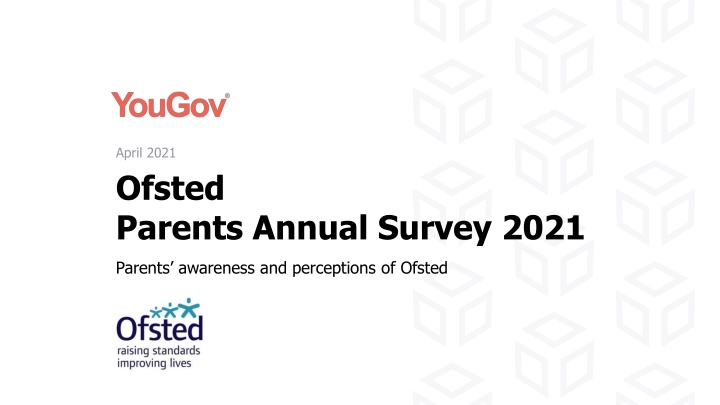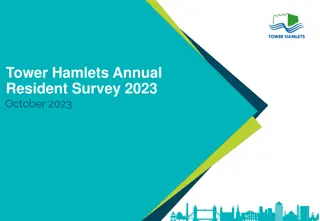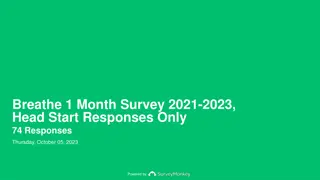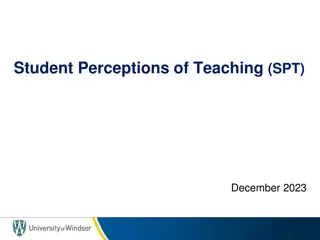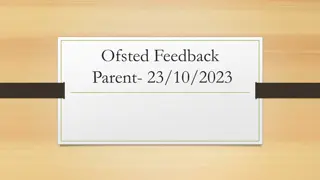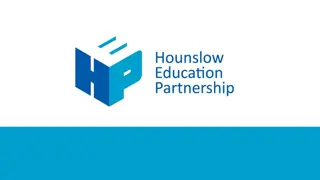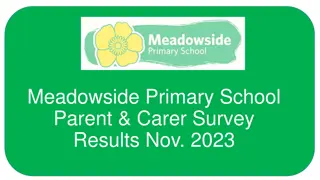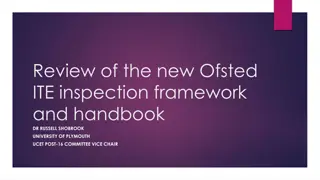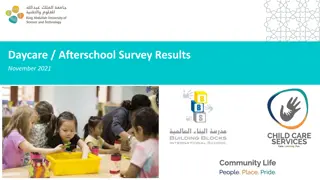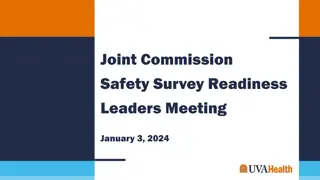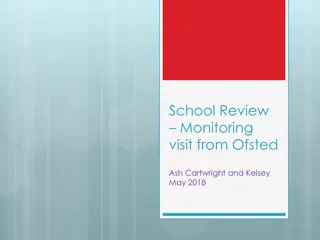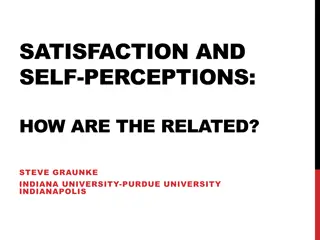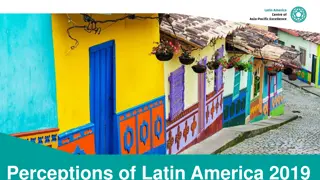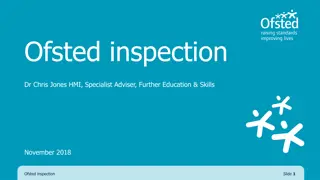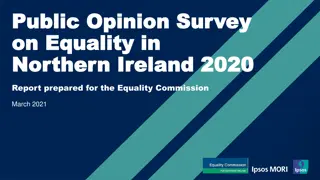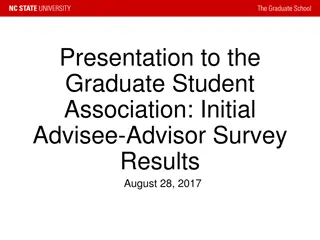Ofsted Parents Annual Survey 2021: Awareness & Perceptions
The Ofsted Parents Annual Survey 2021 provides insights into parents' awareness and perceptions of Ofsted. The study aims to inform Ofsted's strategy based on feedback from over a thousand parents regarding inspection reports, reliability, valuable information, and more.
Download Presentation

Please find below an Image/Link to download the presentation.
The content on the website is provided AS IS for your information and personal use only. It may not be sold, licensed, or shared on other websites without obtaining consent from the author.If you encounter any issues during the download, it is possible that the publisher has removed the file from their server.
You are allowed to download the files provided on this website for personal or commercial use, subject to the condition that they are used lawfully. All files are the property of their respective owners.
The content on the website is provided AS IS for your information and personal use only. It may not be sold, licensed, or shared on other websites without obtaining consent from the author.
E N D
Presentation Transcript
Ofsted Parents Annual Survey 2021 Parents awareness and perceptions of Ofsted
Method The objective of this study was to provide Ofsted with robust and timely evidence from parents to inform the development of the organisation s strategy and priorities. An online survey was developed in conjunction with Ofsted and was carried out among parents between 9th and 26th March 2021. The total number of respondents was 1,018 parents; 916 with a school-age child and 102 with a pre-school-age child attending childcare. The figures have been weighted and are representative of all parents in England by family type, age of family reference person, social grade and region. Throughout the report, net figures are shown and they may be slightly different to the raw data shown in charts due to rounding. This is the sixth year that this research with parents has been carried out by Ofsted. Any statistically significant changes between waves will be identified with and .
Increase No change Summary of key measures Decrease Year-on-year change % in agreement All parents who found the inspection report they read to be useful 84% The information Ofsted provides in reports is reliable* n/a 71% Ofsted is a valuable source of information about education in your local area 68% Ofsted s work helps to improve standards of education 65% Ofsted is a valuable source of information about childcare in your local area 60% *wording on reliability changed in 2021, therefore, comparing is not advised.
Awareness and perceptions of Ofsted 1. Awareness of Ofsted remains high among parents, with 59% reporting they know at least a fair amount. 2. Seven in ten (71%) parents feel Ofsted reports are a reliable source of information. 3. The majority (60%) agree that Ofsted provides a valuable measure of childcare, however, this has declined since 2020 (65%). 4. Agreement that Ofsted is a valuable source of information on education and works to improve education has remained stable since 2016. 5. It remains that one third of parents agree Ofsted acts independently of the government.
Choosing a provider 1. As seen previously, the majority of respondents report that they would use in-person or virtual visits as a source of information when deciding on a childcare provider, school or college. 2. Parents of school-age children are more likely to rely on past experience and school or local authority websites when making a decision, compared with those of pre-school children. 3. Proximity of the provider is the decisive factor in the final choice for both parents of school-age and pre-school children. This is followed by ethos and Ofsted judgement. 4. Compared with parents of pre-school children, parents of school-age children are more likely to report that breadth of subjects is also a decisive factor.
Ofsted ratings and inspection reports 1. Overall, most parents remain aware of the Ofsted rating of their child s school or childcare provider, although awareness has declined among parents of school-age children. 2. Overall, seven in ten parents have read an Ofsted report at some point. For parents of pre-school-age children, this was most likely to help them choose a provider of childcare or school, and for parents with school-age children, this was to check in and see how the school was doing. 3. The large majority (84%) of parents found the report they read useful; this increases to 87% among parents of pre-school children. 4. Eight in ten (80%) felt the report they read portrayed an accurate picture of the school or provider.
Obtaining and sharing parents views 1. Close to a fifth (18%) of parents report that they had the opportunity to, and did, contribute during the last inspection. This increases to 30% when looking specifically at those who reported that their school was inspected within the last two years. Comparatively, 15% report that they did have the opportunity to feedback but they did not and 18% report they did not have any opportunity at all. A quarter (26%) of parents report that they have completed a Parent View survey, either at the time of inspection (18%) or outside of the inspection (8%). Parents of secondary school children are more likely than those of primary school children to report completing a Parent View survey at any time (32% vs 24% respectively). Just under half (45%) of all parents report that they have not completed a Parent View survey and three in ten (29%) state they do not know what a Parent View survey is. 2. 3. 4. 5.
Curriculum 1. Three quarters (76%) of parents report being well informed of their child s curriculum. This is most commonly cited by parents of primary school children (79%), compared with 72% of secondary school children. 2. Just under half (47%) of parents now feel that the school places an equal focus on both good results and the content of learning. 3. There has been a significant decline this year in the belief that their child s school places greater focus on getting good results rather than the content of learning (23% in 2020 to 18% in 2021). 4. A majority of parents feel that the school that their child attends covers the core subjects (English, mathematics and science) sufficiently, with 78% agreeing that English is well covered. 5. Parents with primary-age children are less likely to feel that science is sufficiently covered than those with secondary-age children. This is the only core subject that has this differentiation.
COVID-19 (coronavirus) 1. The large majority of parents think that their child s school handled COVID-19 well (87%). 2. Likewise, seven in ten (69%) report receiving guidance or training to help support remote learning. This is significantly higher among those who have children in primary school (74%) compared with secondary school (63%) 3. Two thirds of parents report being concerned about the impact of COVID-19 on their child s learning loss (67%). This is followed by concern over mental health (65%) and physical health (45%).
Awareness of Ofsted remains very high, with over nine in ten (94%) reporting they know at least a little about them. Of those aware, the majority report knowing a fair amount or a lot (59%). Knowledge of Ofsted 14% 14% 16% 16% Know a lot about them 20% Know a fair amount about them 45% 48% 43% 44% 44% Know just a little about them Heard of them but know nothing about them 36% 35% 36% 34% 32% Never heard of them 3% 3% 4% 5% 3% 1% 2% 1% 1% 1% 2016 (n=1,058) 2017 (n=1,128) 2018 (n=1,111) 2020 (n=1,101) 2021 (n=1,018) Q4. Which of the following statements best describes your knowledge of Ofsted? (Base: all parents of a child aged 0 18.)
Seven in ten parents in England believe that the information in Ofsted reports is reliable; this increases among those who said they have read a report (78%). Reliability of information 77% Parents who have read an Ofsted report are much more likely to feel that the information Ofsted provides in reports is reliable than those who have not read a report (78% vs 57%). 75% 74% 74% 71% Net: Reliable The proportion who agree it is reliable increases among those who are aware of their child s setting s last inspection grade. Three quarters (76%) of this audience state this, compared with just under half (48%) of those who don t know. Net: Not reliable Don't know 19% 18% 17% 16% 16% 11% 10% 9% 7% 6% 2016 (n=919) 2017 (n=1,120) 2018 (n=1,087) 2020 (n=1,094) 2021 (n=1,009) Note: question text* changed in 2021, caution is advised when comparing. 2015 2020: Q20. Thinking in general terms, how reliable or unreliable do you think the information that Ofsted provides is? Please select all that apply. *2021: Q20a. Thinking in general terms, how reliable or unreliable do you think the information in Ofsted reports is? Base: parents who have heard of Ofsted.
Of those who do feel that the information in Ofsted reports is unreliable, the most cited reasons for this are that the provider is different during Ofsted inspections and that inspections are too short to be meaningful, although the latter has declined since last year. Reasons for unreliability 52% 51% The childcare provider, school or college is different during the inspection 55% 53% 44% Inspections are too short to provide a meaningful picture of the childcare provider, school or college 52% 53% 42% 43% 40% Inspectors aren't looking at the right things 50% 50% 37% Too much notice is given to the childcare provider, school or college meaning they can prepare for the inspection 44% 41% 37% 30% Those undertaking inspection don t have the right skills or knowledge to give a reliable judgement 22% 30% 24% 20% 28% 27% 29% Reports are often quite old and therefore not meaningful 14% 7% 7% Other 10% 2017 (n=214) 2018 (n=175) 2020 (n=175) 2021 (n=181) 2017 2020: Q21. Why do you think the information Ofsted provides is not reliable? Please select all that apply (Base: all parents who feel the information Ofsted provides is not reliable.) 2021: Q21a. If you think Ofsted reports are not reliable, why do you think so? Please select all that apply (Base: all parents who feel the information in Ofsted reports is not reliable.)
Three in five parents agree that Ofsted is a valuable source of information about childcare locally, a decline since last year. Ofsted is a valuable source of information about childcare in your local area 66% 65% 63% 63% Net: Agree 60% Neither agree nor disagree Net: Disagree 22% 21% 20% 20% 20% 10% 10% 10% 8% 8% Don't know 9% 7% 7% 6% 3% 2016 (n=1,158) 2017 (n=1,120) 2018 (n=1,087) 2020 (n=1,094) 2021 (n=1,009) Parents of children in nursery are most likely to agree with this statement (74%), compared with 59% of those with school-age children. While this is most likely as a result of school children s parents lack of knowledge on this, as their levels of disagreement are similar, parents of school children have seen a significant decline in agreement since 2020 (64%). Possibly linked to this, parents aged 18 34 are most likely to agree with this statement, with seven in ten (69%) agreeing, compared with six in ten (58%) of those aged 35+. As previously, parents aged 35 and over also experienced a significant decline in agreement since 2020 (64%). Q23. To what extent do you agree or disagree with the following statements? (Base: all parents who have heard of Ofsted.)
Comparably, agreement that Ofsted is a valuable source of information on education remains unchanged since 2016, at seven out of ten parents. Ofsted is a valuable source of information about education in your local area Net: Agree 69% 69% 68% 68% 67% 67% Neither agree nor disagree Net: Disagree 21% 19% 19% 18% 18% 17% 11% 11% 10% 9% 4% 9% 3% 9% 3% Don't know 3% 2% 3% 2016 (n=1,050) 2017 (n=1,000) 2018 (n=978) 2020 (n=1,094) 2021 (n=1,009) Although there is no difference in agreement, parents with children at secondary school are more likely to disagree (12%), compared with those who have children in primary school (8%). Parents of nursery-age children are most likely to agree with this statement (78%), compared with just over two thirds of those with school-age children (67%). Q23. To what extent do you agree or disagree with the following statements? (Base: parents of a school-age child who have heard of Ofsted.)
Likewise, agreement that Ofsteds work helps to improve standards of education is level at just under two thirds (64%). Ofsted s work helps to improve standards of education Net: Agree 68% 65% 65% 65% 64% 64% Neither agree nor disagree Net: Disagree 21% 20% 20% 20% 11% 19% 15% 18% 13% 3% 11% 10% 3% 12% 3% Don't know 4% 3% 5% 2015 (n=1,065) 2016 (n=1,050) 2017 (n=993) 2018 (n=978) 2020 (n=995) 2021 (n=907) Those who are aware of their child s school s Ofsted rating are most likely to agree with this statement. Of this audience, two thirds (67%) agree, compared with just under half (48%) of those who are not aware of the rating. Those whose child attends school in London are most likely to agree (73%), while those in the North West (57%) are least likely to. Q23. To what extent do you agree or disagree with the following statements? (Base: parents of a school-age child who have heard of Ofsted.)
Agreement that Ofsted acts independently of the government is stable year on year, with just over a third agreeing (35%). Those who report they know more about Ofsted are more likely to agree than those who reporting knowing little or nothing. Ofsted acts independently of government 21% 22% Those who report they know either a fair amount or a lot about Ofsted are more likely to agree that Ofsted acts independently of the government, compared with those who report they know just a little or know nothing (39% vs 29%). 5% 5% 14% 15% 24% 25% 27% 28% 8% 6% 2020 (n=1,094) 2021 (n=1,009) Strongly agree Agree Neither agree nor disagree Disagree Strongly disagree Don t know Q24_3. To what extent do you agree or disagree with the following statements? (Base: parents who have heard of Ofsted.)
Parents are favourable towards the four-point grading system, with two thirds (66%) agreeing it helps them to make decisions about their child s education. Over half (56%) believe Ofsted acts in the best interests of children. Agreement on Ofsted 2021 = 1,009 Ofsted acts in the best interests of children 14% 42% 27% 8% 4% 5% The four-point Ofsted grading system is useful in helping me make decisions about my child s education 16% 50% 17% 8% 3% 6% Strongly agree Agree Neither agree nor disagree Disagree Strongly disagree Don t know Those who have read an Ofsted report (72%) are more likely to agree that Ofsted s grading system is useful in helping make decisions about their child s education, compared with 54% of those who have not. Q23_6 to 7. To what extent do you agree or disagree with the following statements? (Base: parents who have heard of Ofsted.)
For parents of both nursery and school-age children, visiting is their main source of information about whether a provider would be right for their child. Parents of school age children are more likely to rely on past experience and local authority websites. Go to for information on the provider 62% Visiting in person or via a virtual visit 52% 39% Ofsted reports 44% 40% 44% Word of mouth from other parents 10% Past experience 27% 41% The childcare provider, school or college website 24% 9% My Local Authority website 18% 23% Online reviews 9% 10% Social media 5% 6% 6% Other 2% 4% I don t remember Parents of pre-school-age children 4% 5% Parents of school-age children Not applicable Significantly higher than other provider group at 95% confidence level. Q1a. When deciding which childcare provider, school or college was right for your child, where did you get your information from? Please select all that apply. (Base: all parents (n=1,018; nursery-age children n=102; school- age children n=916.) Significantly lower than other provider group at 95% confidence level.
Proximity of the provider is the decisive factor in the final choice, followed by the provider s ethos and the Ofsted judgement. While ethos is most important for pre-school parents, parents of school-age children are more likely to cite latest exam or test results or breadth of subjects. Decisive factor for parents choice of provider 64% Proximity of the childcare provider, school or college to your home 56% 51% The ethos or values of the childcare provider, school or college 38% 38% Ofsted judgement 34% 27% Ofsted report 30% 7% Siblings at the childcare provider, school or college 20% 5% The breadth of the subjects on offer at the school/college 15% Latest exam or test results 14% The childcare provider, school or college reputation for working with SEND children 7% 7% 15% Availability of wrap-around care 7% 2% The particular faith-based affiliation of the childcare provider or school 6% 3% 4% The specialism of the school Parents of pre-school-age children 13% Other 5% Parents of school-age children 5% 4% None of these Significantly higher than other provider group at 95% confidence level. Q2. Which of the following, if any, were important to you when making your decision? Please select up to 3. (Base: all parents who had a choice (n=964; nursery-age children n=98; school-age children n=866.) Significantly lower than other provider group at 95% confidence level.
Overall, 84% of all parents of school-age children are aware of Ofsted s rating at their last inspection, a decline since last year, while awareness among pre-school parents is stable. Awareness of Ofsted grade Net 'Know' rating Don't know This decline in recall for parents of school- age children could be as a result of the suspension of standard inspections during the COVID-19 pandemic. 87% 87% 89% 88% 84% 13% 13% 11% 12% 16% Parents of a school-age child 2016 (n=1,050) Parents of a school-age child 2017 (n=993) Parents of a school-age child 2018 (n=1,000) Parents of a school-age child 2020 (n=995) Parents of a school-age child 2021 (n=907) Parents of school- age children are more likely than pre- school-age children to be aware of the Ofsted rating at the last inspection. 83% 85% 85% 77% 73% 17% 15% 15% 23% 27% Parents of a pre-school child 2016 (n=108) Parents of a pre-school child 2017 (n=127) Parents of a pre-school child 2018 (n=111) Parents of a pre-school child 2020 (n=99) Parents of a pre-school child 2021 (n=102) Q6. What grade was your child s childcare provider, school or college given at the last inspection? (Base: all parents who have heard of Ofsted.)
Similar to last year, 68% of parents state they have read an Ofsted report at some point. Read an Ofsted report 6% 6% 25% 26% 70% 68% 2020 (n=1,094) 2021 (n=1,009) Don t know Yes No Q9a. Have you ever read an Ofsted inspection report? (Base: parents who have heard of Ofsted.)
Parents are most likely to use a report to find out how their child s provider is doing (57%), although this has declined since last year. Reasons for reading report Make a decision about which school/college/childcare provider to choose in the first instance 37% 35% 38% Primary school parents are more likely than secondary school parents to report reading it when moving house (13% vs 5%). 13% 13% 11% Inform decisions about moving your child 14% Consider what further support your child might need, such as tutoring 9% 6% 0% Two thirds (65%) of secondary school parents state they read reports to find out how their child s provider is doing. This is significantly higher than primary school parents (52%). *To find out how my child's school/college/childcare provider is doing 62% 57% **When moving house 9% 18% 10% For another reason 14% 22% 5% 4% I can t remember 2018 (n=923) 2020 (n=767) 2021 (n=692) Q11. If you have read an Ofsted inspection report, what did you use the report for? (Base: parents who have read an Ofsted report.) *Asked for the first time in 2020. **Asked for the first time in 2021.
Reasons for reading report: school-age vs pre-school-age Parents of school- aged children were most likely to have read an Ofsted report to see how the school is doing, while parents of younger children are more likely to have read a report to decide on the provider initially. Make a decision about which school/college/childcare provider to choose in the first instance 56% 36% 4% Inform decisions about moving your child 11% 2% Consider what further support your child might need, such as tutoring 6% 36% *To find out how my child s school/college/childcare provider is doing 58% 12% 9% Parents of a pre- school child 2021 (n=61) **When moving house 25% For another reason 13% Parents of a school- age child 2021 (n=631) 1% I can t remember 5% Significantly higher than other provider group at 95% confidence level. Q11. If you have read an Ofsted inspection report, what did you use the report for? (Base: parents who have read an Ofsted report) *Asked for the first time in 2020. **Asked for the first time in 2021. Significantly lower than other provider group at 95% confidence level.
With minimal change year on year, 83% of parents with school- age children and 87% of parents with pre-school-age children found the Ofsted report they read useful. Ofsted report is useful 81% 79% 79% 81% 83% 16% 17% 18% 16% 14% 2% 4% 3% 2% 3% Parents of a school-age child 2016 (n=902) Parents of a school-age child 2017 (n=855) Parents of a school-age child 2018 (n=839) Parents of a school-age child 2020 (n=699) Parents of a school-age child 2021 (n=631) 86% 12% 2% 4% 1% 0% 4% Parents of a pre-school-age child 2016 (n=78) 77% 19% Parents of a pre-school-age child 2017 (n=105) 87% 86% 87% 12% 14% 9% Parents of a pre-school-age child 2018 (n=84) Parents of a pre-school-age child 2020 (n=68) Parents of a pre-school-age child 2021 (n=68) 84% 14% 3% All parents 2021 (n=692) Useful Not useful Not sure Q12. How useful to you was the Ofsted inspection report that you read? (Base: parents who have read an Ofsted report.)
Accuracy of Ofsted report for school or childcare provider Four in five parents who read a report felt it portrayed an accurate picture of the school or childcare provider; 13% felt it was not accurate. 4% 5% 14% 13% 80% 80% 2020 (n=767) 2021 (n=692) Accurate Not accurate Don t know Q12a. After reading the report, to what extent, if at all, do you feel that it portrayed an accurate picture of the school, college or childcare provider? (Base: all parents who have read an Ofsted report.)
Schools handling of COVID-19 Close to nine in ten parents believe their child s school has handled COVID-19 well. 1% 2% 2% 3% 3% 2% 6% 8% 10% 37% 39% 41% Those who report they are well informed about what their children are learning are most likely to say the school has handled COVID-19 well (93%) compared with 70% who don t feel well informed. 52% 49% 45% All (n=916) Primary (n=511) Secondary (n=370) Very well Somewhat well Not very well Not at all well Don't know Significantly higher than other provider group at 95% confidence level . Significantly lower than other provider group at 95% confidence level. COVID1. How well do you think your child s school handled the COVID-19 crisis? (Base: all parents of school children (n=916).)
Two thirds report having received guidance or training to help with remote learning from their child s school, with parents of primary school children most likely to state this. Help received for remote learning 1% 2% 2% 3% 3% 6% 6% 9% 12% 25% 18% 18% Don't know 20% 23% No help at all 41% 44% 46% 43% Hardly any help 42% Some help 29% 29% 29% 26% 21% A lot of help 4% All (n=916) Parents of primary school children (n=511) Parents of secondary school children (n=370) Parents who thought the school handled COVID-19 well (n=799) Parents who didn t think the school handled COVID-19 well (n=99) Significantly higher than other provider group at 95% confidence level. COVID3. As a parent, how much guidance or training from your child's school have you received to help you support their remote learning? (Base: all parents of school children (n=916).) Significantly lower than other provider group at 95% confidence level.
Close to two thirds report concern over the impact of COVID-19 on their child s loss of learning and their mental health. Concern of COVID-19 s impact Parents of children in secondary school are more likely to be concerned about loss of learning (71%), compared with 64% of parents of primary school children. 27% 40% 20% 12% 1% Your child s loss of learning Parents of children with SEND are more likely to be concerned about the impact on mental health (77%), compared with 63% of parents of children without SEND. 22% 44% 25% 9% 1% Your child s mental health 11% 34% 35% 20% 1% Your child s physical health Extremely concerned Somewhat concerned Not very concerned Not at all concerned Don't know COVID2. Thinking about the impact of the COVID-19 pandemic to what extent, if at all, would you say you are concerned about the following? (Base: all parents of school children (n=916).)
A fifth of parents who had a child in the school at the most recent inspection felt they did not get a chance to contribute feedback. Chance to contribute during last inspection (school inspected within last two years) Chance to contribute during last inspection 18% 30% Yes and I did feed back/contribute Yes and I did feed back/contribute Yes, I had the opportunity but didn't feed back/contribute Yes, I had the opportunity but didn't feed back/contribute 15% 20% No, I didn't have the opportunity to feed back/contribute No, I didn't have the opportunity to feed back/contribute 18% 28% 16% 7% Don't know Don't know Not applicable my child was not at the school, college or childcare provider when it was last inspected Not applicable my child was not at the school, college or childcare provider when it was last inspected 34% 15% A3_2020. When your child s school was last inspected, did you, as a parent, get a chance to feed back or contribute? (Base: those who had a child at the school when it was last inspected and all parents who have heard of Ofsted (n=1,009; if school was inspected within last two years n=277).)
Overall, a quarter (26%) of parents have completed a Parent View survey. Most are parents of secondary-school- age children. Completed a Parent View survey Most likely to complete Parent View: 18% 17% Yes, at time of inspection 23% Parents of children with SEND are more likely than parents of children without SEND (45% vs 24%). 8% 7% Yes, outside of inspection 10% 45% Parents who have read an Ofsted report are more likely than parents who haven t (33% vs 10%). 48% No 41% 29% 29% 27% I don't know what Parent View is Parents who are aware of the setting s last inspection grade are more likely than those who aren t (30% vs 8%). All aware of Ofsted (n=1,009) Parents of primary school children 2021 (n=504) Parents of secondary school children 2021 (n=369) 26% 24% Net: yes 32% Significantly higher than other provider group at 95% confidence level. Significantly lower than other provider group at 95% confidence level. PV1. Have you ever completed Parent View? (Base: parents who have heard of Ofsted (n=1,009).)
Three quarters of parents feel they have been well informed about their child's curriculum. Informed of curriculum* Parents of primary school children are the most likely to feel well informed about what their child will be learning. This is significantly higher than parents of secondary school children. All parents of school children (n=916) 34% 41% 18% 4% 2% Parents of children in Reception (83%), Year 1 (80%) and Year 2 (81%) feel most informed. Parents of primary school children (n=511) 35% 44% 16% 3% 2% Parents of secondary school children (n=370) 35% 38% 21% 5% 1% Very well informed Slightly well informed Not very well informed Not well informed at all Don't know QC1a. How well do you feel the school has informed you about what your child will be learning (the curriculum)? *Question changed for 2021 to focus on feeling informed. Before being asked the question, respondents were shown this definition of the curriculum : The curriculum is everything that your child is taught about in school. It means all the subjects they study and all the knowledge and skills they acquire during their time at school. Significantly higher than other provider group at 95% confidence level. Significantly lower than other provider group at 95% confidence level.
Parents remain most likely to feel that the school places an equal focus on both results and learning. The belief that there is a greater focus on getting good grades has declined since last year. Opinion of content of child s learning Parents of secondary school children are more likely to report the focus is on getting good results rather than the content of learning (23%) compared with 18% of parents of primary school children (15%). 24% 23% Places a greater focus on getting good results for children than the content of a child s learning 18% Comparatively, a quarter (25%) of primary school parents think there is a greater focus on the content of the learning. This is significantly higher than secondary school parents (15%). 19% 20% 21% Places a greater focus on the content of a child s learning than getting good results for children 46% 49% 47% Parents who previously said they are well informed are the most likely to report that the school places an equal focus on results and content (54%). Comparatively, significantly less (28%) of those who didn t feel informed report this. Places equal focus on both good results and the content of learning 11% 9% Don t know 2018 (n=1,000) 2020 (n=1,002) 2021 (n=916) 14% QC2. In your opinion, do you think your child s school... (Base: parents of school children (n=1,002).)
Covering of subjects Parents are most likely to feel core subjects of mathematics and English are well covered. However, comparatively, science sees lower levels of agreement. 78% 78% English Mathematics 60% Science 39% History* 36% Geography* 27% Languages* 41% Religious education 38% Art and design* 28% Music* 24% Design and technology* 21% PSHE 16% Sex and relationship education** *Asked to only key stages 1, 2 and 3 13% Citizenship** 54% Physical education **Asked to only key stages 3 and 4 39% Computing 2% None of these 11% Don t know QC4a_rb/2/3. Which, if any, of the following main subject areas do you feel that your child s education sufficiently covers? Please select all that apply. (Base: all parents of school children (n=916).) *Caution advised when analysing subjects that were not shown to all overall percentages will be lower for those that were not asked to the whole sample due to averaging. For a breakdown by key stage, please use the next slide.
A similar story can be seen when looking at key stage. Parents of key stage 3 and 4 pupils more commonly report science as being sufficiently covered compared with parents of key stage 1 and 2 pupils. Covering of subjects by key stage Key stages 1 and 2 79% 80% 51% 41% 35% 21% 38% 43% 27% 18% 55% 31% 1% 12% Don't know Key stages 3 and 4 76% 77% 71% English English Mathematics Science History Geography Languages Mathematics Science 63% 64% 59% History Geography 46% Religious education Art and design Languages 56% Religious education 50% Music Art and design 55% Design technology 47% PSHE Music 36% Sex and relationship education Design technology 28% Citizenship Physical education 53% Physical education Computing None of these Don't know Computing 48% None of these 3% *key stage 3 data only 10% QC4a_rb/2/3. Which, if any, of the following main subject areas do you feel that your child s education sufficiently covers? Please select all that apply. (Base: all parents of school children (key stage 1 and 2 n=533; key stage 3 n=228; key stage 4 n=155).)
www.gov.uk/ofsted https://reports.ofsted.gov.uk www.linkedin.com/company/ofsted www.youtube.com/ofstednews www.slideshare.net/ofstednews www.twitter.com/ofstednews Ofsted - Parents Annual Survey 2021, Parents awareness and perceptions of Ofsted. April 2021
